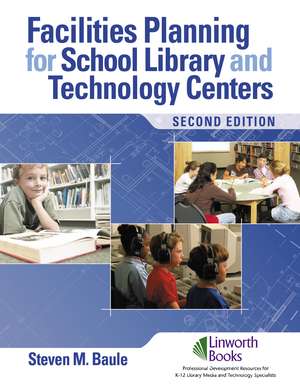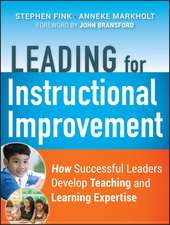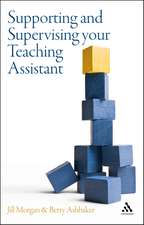Facilities Planning for School Library Media and Technology Centers
Autor Steven M. Bauleen Limba Engleză Paperback – 18 feb 2007 – vârsta până la 17 ani
Preț: 237.81 lei
Preț vechi: 289.34 lei
-18% Nou
Puncte Express: 357
Preț estimativ în valută:
45.50€ • 47.42$ • 37.68£
45.50€ • 47.42$ • 37.68£
Carte tipărită la comandă
Livrare economică 03-17 aprilie
Preluare comenzi: 021 569.72.76
Specificații
ISBN-13: 9781586832940
ISBN-10: 1586832948
Pagini: 144
Dimensiuni: 216 x 279 x 10 mm
Greutate: 0.36 kg
Ediția:2
Editura: Bloomsbury Publishing
Colecția Linworth
Locul publicării:New York, United States
ISBN-10: 1586832948
Pagini: 144
Dimensiuni: 216 x 279 x 10 mm
Greutate: 0.36 kg
Ediția:2
Editura: Bloomsbury Publishing
Colecția Linworth
Locul publicării:New York, United States
Notă biografică
Steven Baule is the superintendent of schools at Westmont Community Unit School District 201 in Westmont, IL.
Recenzii
Baule has experience as classroom teacher, library media specialist, technology director, and assistant superintendent for information technology. His wealth of experience in facilities planning shows in this second edition of his popular planning book. In simple but not simplified terms, he provides information on how to put together a planning team; how to perform a needs assessment for the library media center or technology lab; how to create bid documents and specification charts; how to develop time lines; and how to plan to move into the new facility once construction is complete. The helpful appendix contains checklists that will keep users organized and on track. Choices made in construction and furnishings will probably be around for more than 20 years, so anyone who is going to build or renovate a facility will want this book.
In this highly useful and practical guide, Baule provides information on all aspects of facilities planning for school library media centers and technology labs. Chapters cover initial and team planning, organization of visits at other sites, assessing needs, bid specifications and time lines, and the moving process. Baule takes into consideration educational issues that affect the need for flexibility and expandibility in designing new facilities, although he does not relate these issues more directly to American Assocation of School Librarians (AASL) information literacy standards. Floor plans for existing school library media centers are provided plus several suggested schematics for elementary, middle, and high school library media centers. Detailed specifications for shelving, storage spaces, and furniture are provided. Other topics include design and placement of computer spaces in the media center, design of circulation desks, furniture, lighting, color and design, signage, and security issues. Useful questionnaires to help determine requirements are included in the appendix. One of the book's strengths is the focus on planning and designing spaces for technology labs. Various floor plans are provided, together with the advantages and disadvantages of each. Specifications are given for wireless networks, wiring, and cabling, and discussion includes the provisions of mobile laptop labs, language labs, and computer furniture. This fine basic text is written in a straight-forward manner that will especially benefit those school library media specialists facing the prospect of designing or renovating a school library media center for the first time. It is an excellent resource for professional development collections.
In this highly useful and practical guide, Baule provides information on all aspects of facilities planning for school library media centers and technology labs. Chapters cover initial and team planning, organization of visits at other sites, assessing needs, bid specifications and time lines, and the moving process. Baule takes into consideration educational issues that affect the need for flexibility and expandibility in designing new facilities, although he does not relate these issues more directly to American Assocation of School Librarians (AASL) information literacy standards. Floor plans for existing school library media centers are provided plus several suggested schematics for elementary, middle, and high school library media centers. Detailed specifications for shelving, storage spaces, and furniture are provided. Other topics include design and placement of computer spaces in the media center, design of circulation desks, furniture, lighting, color and design, signage, and security issues. Useful questionnaires to help determine requirements are included in the appendix. One of the book's strengths is the focus on planning and designing spaces for technology labs. Various floor plans are provided, together with the advantages and disadvantages of each. Specifications are given for wireless networks, wiring, and cabling, and discussion includes the provisions of mobile laptop labs, language labs, and computer furniture. This fine basic text is written in a straight-forward manner that will especially benefit those school library media specialists facing the prospect of designing or renovating a school library media center for the first time. It is an excellent resource for professional development collections.





